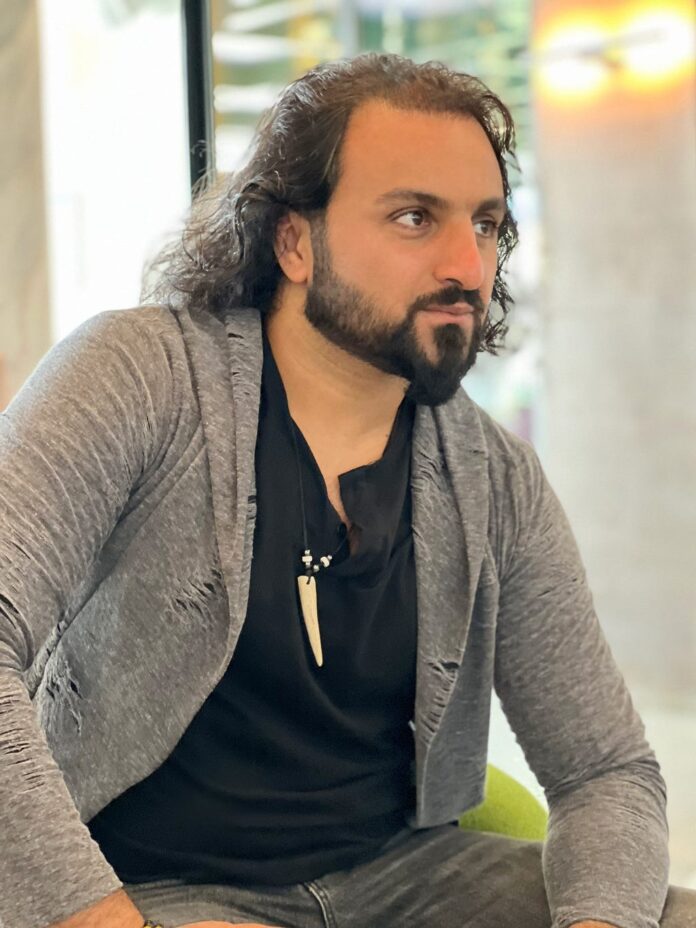Startup Savvy: Young Entrepreneur Shahrouz Varshabi Of Designity Shares Their Secrets For Rapid Growth and Success
An Interview With Eden Gold
Prioritize Learning: Continuous improvement is crucial; always be willing to learn new skills and technologies.
The entrepreneurial landscape is more vibrant and challenging than ever, with young entrepreneurs at the forefront, driving innovation and redefining the boundaries of success in the business world. These dynamic individuals are not only creating new products and services but also building sustainable business models that thrive in today’s fast-paced, technology-driven environment. Their journeys are filled with lessons of resilience, strategic innovation, and the relentless pursuit of growth. As part of this series, we had the pleasure of interviewing Shahrouz Varshabi, founder and CEO of Designity.
Shahrouz Varshabi is an enterprising immigrant from Tehran, Iran, who has successfully established himself in New York City. Known for his relentless determination and ability to develop innovative products from minimal resources, Shahrouz exemplifies the spirit of a visionary entrepreneur. As the founder and CEO of Designity, Shahrouz is pioneering the future of the creative industry with the first collaborative creative platform. Designity connects clients directly with the top 3% of US-based creatives and creative directors, facilitating collaboration on various creative projects without the need for intermediaries. This groundbreaking approach not only enhances efficiency but also empowers the creative community by giving them control over their work.
Thank you so much for joining us in this interview series. Before we dive into our discussion about cultural sensitivity, our readers would love to “get to know you” a bit better. Can you share with us the backstory about what brought you to your specific career path?
Although I was driving a taxi in my early career back in Iran, I was a graphic designer at heart. I loved designing and making things. When I moved to New York to pursue my master’s degree in Design and Technology at Parsons The New School, I was immersed in a world of creativity and innovation. However, upon graduation, I found myself, along with many of my peers, struggling to find employment. It was shocking to see so many talented individuals with master’s degrees from prestigious institutions facing difficulties in navigating the real world. This realization sparked the idea for Designity. I envisioned a platform where design students could work with clients during their final year of school to gain real-world experience. This concept evolved into our unique business model. We introduced a system where emerging creatives are supervised by experienced creative directors, expanded the team to include more senior creatives, developed a subscription model, and ultimately pioneered ‘Creatives as a Service’ (CaaS). This innovative approach has not only provided invaluable professional experience for students but also a steady stream of fresh talent for the industry.
Can you share the most interesting story that happened to you since you started your career?
One of the most pivotal moments early in our journey occurred when our original company name, Designedin, attracted a lawsuit from LinkedIn. They claimed that our name was too similar to theirs, particularly the suffix “edin”. This legal challenge could have been a major setback, but instead, it turned into an unforeseen advantage. We settled the lawsuit amicably, and interestingly, the settlement included a payment from LinkedIn. This unexpected cash infusion early in our days of bootstrapping was crucial. It not only helped us financially to rebrand but also, humorously enough, you could say LinkedIn became our first ‘client’ in a very unconventional way. We rebranded to “Designity,” a name that better reflected our vision of blending design with community and moved forward with a clearer identity and additional resources to grow our business.
You are a successful individual. Which three character traits do you think were most instrumental to your success? Can you please share a story or example for each?
Resilience: To me, this is the number one trait required to be successful. It’s often said, “Don’t change your goal, change your strategy.” This was proven to me in many cases, from navigating visa challenges and job constraints which required an immense amount of resilience. I recall times when I almost gave up, but pushing through those barriers eventually paid off. This trait was also crucial when facing rejections from investors, pushing me to bootstrap the company and even sleep on the couch for almost a year.
Innovativeness: Utilizing Typeform, a refreshingly different form builder and data collection platform, to A/B test various aspects of Designity without heavy investments was crucial. This innovative approach allowed us to refine our business model effectively and cost-efficiently. Spending tons of money on building tech is one of the biggest mistakes entrepreneurs make, and I made that mistake too before discovering Typeform. With the power of automation and feedback forms, we were able to save millions in operating expenses and now use Typeform solutions across our entire business to automate functions, collect and analyze data from clients, and more. Typeform has helped us increase lead generation, community member and client onboarding activities.
Determination: The early days required working evenings and weekends after my day job. My determination to see Designity succeed kept me going despite the exhaustion and challenges. There is a big difference between wanting success and actively pursuing it. The question is how much you want it, and if the answer is “very badly,” then you’re willing to sacrifice everything to achieve it.
Ok, thank you for that. Let’s now jump to the primary focus of our interview about young entrepreneurs secrets to rapid growth and success. To start, how would you define success?
To me, success is fundamentally about finding happiness in life, irrespective of one’s profession or location. It’s about achieving a state of contentment and joy that transcends external circumstances. I’ve observed many individuals who possess wealth and traditional markers of success, yet they live in a state of misery. Conversely, I know workers who might seem ordinary by conventional standards but cherish every moment of their lives. True success, therefore, isn’t measured by material accumulations but by the ability to relish life’s experiences and maintain a joyful spirit. If you can wake up every day happy with where you are and what you’re doing, then you’ve truly succeeded.
What unconventional strategy did you employ that significantly contributed to your startup’s growth, and why do you think it was so effective?
I focused on selling the idea and pivoting based on whether the product I was planning to build would sell or not. I remember days when I had a sales PowerPoint and a sales script in hand, finding emails on Craigslist from companies looking for a graphic designer. I reached out to them trying to sell Designity, which at that time was just a concept and didn’t even exist yet. Believe it or not, I was selling a product that didn’t exist and then spending nights figuring out how to deliver what I had sold. This approach helped me build a product that clients actually needed. This is very important because entrepreneurs normally do it the other way around. They build a fancy product using millions of dollars from venture capital firms and then try to sell it, which is why 95% of startups fail.
Can you share a critical pivot point in your startup’s journey and how you navigated the decision-making process?
A pivotal moment in our startup’s journey occurred when we decided to transition from a per-project billing model to a subscription-based model. At the time, we were struggling to stabilize revenue with the per-project approach, compounded by the challenge of constantly changing project scopes, which is a common issue in the creative services industry. The idea of switching to a subscription model was daunting; many advised against it, arguing that no one would pay a monthly fee for creative services. Despite these concerns, we chose a cautious strategy: we maintained the per-project model while simultaneously introducing the subscription option, which we presented as a more attractive and sophisticated alternative. To our surprise, many companies opted for the subscription model, drawn by its predictability and simplicity. This successful strategy allowed us to eventually phase out the per-project model completely, solidifying our revenue streams and simplifying our service offerings.
How do you balance the need for rapid growth with maintaining a sustainable and healthy company culture?
It’s all about setting clear values and expectations from the start. We encourage open communication, continuous learning, and a supportive environment where mistakes are seen as growth opportunities. Balancing growth with culture means embedding these values into every layer of the company. We have very strong values at Designity and overcommunicate them with the team to keep everyone on the same page. Tools like Typeform also allow us to connect better with not only our clients but also employees by collecting ongoing feedback. For example, with Typeform we built a true peer-to-peer performance review system where members of our Designity community collect points for submitting and receiving reviews from each other and clients. These accrued points allow for leveling up, where members advance their careers.
In what ways has your personal definition of success evolved since the inception of your startup?
Initially, my definition of success was purely about financial stability and simply making it through the next month. Now, it has evolved to focus more on the impact we can make. Success for me is about the positive influence we can have on the lives of creatives through our services and the nurturing environment our company culture provides.

Based on your experience and research, can you please share “5 Things You Need to Succeed as a Young Person in Business?”
- Embrace Failure: View each setback as a stepping stone.
- Network Effectively: Every interaction could lead to a new opportunity.
- Stay Lean: Use technology to minimize costs while maximizing output.
- Be Adaptable: Stay open to changing paths as the market or your goals evolve.
- Prioritize Learning: Continuous improvement is crucial; always be willing to learn new skills and technologies.
What is one piece of advice you would give to an aspiring entrepreneur that you wish someone had given you at the start of your journey?
“Focus on the solution, not just the product.” Early on, I was fixated on perfecting the product without fully understanding the problem it was solving. Real success comes from being solution-oriented.
You are a person of great influence. If you could start a movement that would bring the most amount of good to the most amount of people, what would that be? You never know what your idea can trigger. 🙂
I would start a global initiative focused on integrating design thinking into early education systems. Teaching children to think creatively and solve problems can transform societies, fostering innovation and empathy from a young age.
How can our readers further follow you online?
Readers can follow me on LinkedIn, Instagram, and other social media platforms. My handle is @Varshabi everywhere. They can also learn more about our journey at https://www.designity.com/story
Thank you for the time you spent sharing these fantastic insights. We wish you only continued success in your great work!
About The Interviewer: Eden Gold, is a youth speaker, keynote speaker, founder of the online program Life After High School, and host of the Real Life Adulting Podcast. Being America’s rising force for positive change, Eden is a catalyst for change in shaping the future of education. With a lifelong mission of impacting the lives of 1 billion young adults, Eden serves as a practical guide, aiding young adults in honing their self-confidence, challenging societal conventions, and crafting a strategic roadmap towards the fulfilling lives they envision.
Do you need a dynamic speaker, or want to learn more about Eden’s programs? Click here: https://bit.ly/EdenGold.
Startup Savvy: Young Entrepreneur Shahrouz Varshabi Of Designity Shares Their Secrets For Rapid… was originally published in Authority Magazine on Medium, where people are continuing the conversation by highlighting and responding to this story.


